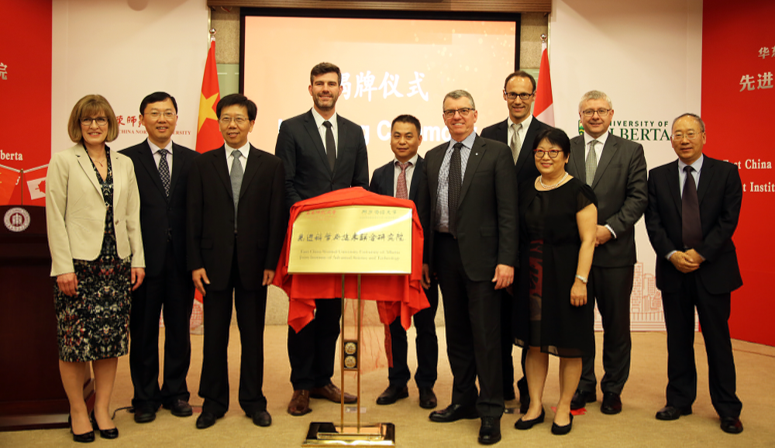
Optoelectronic information and advanced nanomaterials science are two fields of the six major scientific fields currently encouraged by Shanghai, and play a pivotal role in modern human activities. They have currently become the main economic driving force, and are gradually changing the work and life of human beings and providing solutions to global challenges in fields like energy, education, agriculture and healthcare.
The University of Alberta is one of Canada’s top comprehensive universities and has more than 400 laboratories and several National Institutes. Its National Institute for Nanotechnology is the research and development center for nanotechnology in Canada. East China Normal University has carried out a long-term innovative research in the field of optoelectronic information and advanced nanomaterials and formed the advantages and characteristics of high-resolution, high-precision and high-sensitivity spectroscopy. The two universities started intercollegiate cooperation in 2007 with a student research apprenticeship program. They decided to establish the East China Normal University-University of Alberta Joint Institute of Advanced Science and Technology (JIAST) and signed relevant cooperation agreements in 2016 and 2017.
The unveiling ceremony of JIAST was officially held in East China Normal University on May 16, 2018. Many guests and leaders of Canada's universities and government officials attended this ceremony, including a 14-member delegation from Canada: UAlberta's president David Turpin and his wife Suromitra Sanatani, vice president Heather McCaw of UAlberta , the consul general Weldon Epp of Canada in Shanghai, mayor Don Iveson of Edmonton City, and Ron Hoffmann, Alberta senior representative for the Asia Pacific Basin. In addition, Jun Wu, vice director general of Zhangjiang Administration of the Management Committee of Shanghai Pilot Free Trade Zone and vice irector of Zhangjiang High-tech Park Management Committee, the president Xuhong Qian of ECNU; the vice president Rongming Wang of ECNU; director Jian Wu of the State Key Laboratory of Precision Spectroscopy, director Zhuo Sun of MOE Engineering Research Center for Nanophotonic & Advanced Instrument in ECNU, and vice dean E Wu of the School of Physics and Materials Science were also attened the unveiling ceremony. The ceremony was presided by Rongming Wang.

On June 5, 2018, Qiang Li, Secretary of Shanghai Municipal Committee, inspected the State Key Laboratory of Precision Spectroscopy. After hearing that the JIAST would bring together some of the world’s most distinguished scientists in optoelectronic information and advanced nanomaterials to carry out major cutting-edge research, Qiang Li said that introduction and cultivation of a talent can sometimes bring out a team and create an industry. He also side we need to attract a group of global influential scientists, promote the cultivation of a group of urgently needed and high-end talents.

The establishment of the JIAST is a model of the cooperation between China and Canada in higher education and realizes the leap-forward development of scientific and technological innovations in optoelectronic information and advanced nanomaterials. JIAST will bring together leading scientific research institutes and scientific masters and serve as an important example of Shanghai's science and innovation center with global influence.

